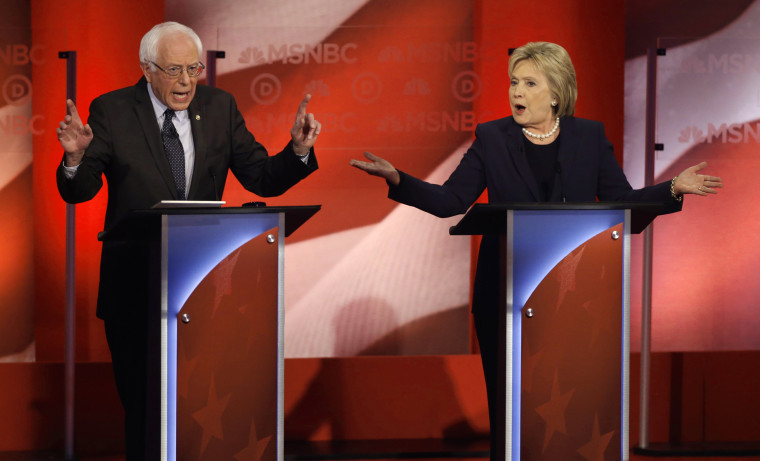What year is it again? Right now, the Russians are busy hacking organizations, the presidential candidates are getting whiter, and we’re debating whether or not a woman can become president of the United States.
But it wasn’t until CNN’s MJ Lee reported that during a 2018 meeting, Democratic presidential candidate Sen. Bernie Sanders told fellow candidate Sen. Elizabeth Warren that he “did not believe a woman could win” the presidency that the 2016 time warp crystallized. It doesn’t just feel like we’re back in 2016, we’re acting like it. Because while the two presidential hopefuls are attempting to keep it civil publicly — a strategy that (mostly) worked during Tuesday’s Democratic debate — the online reaction from some of their most vocal supporters has made it clear that the wounds left from the last presidential election are still fresh. In many ways, they’ve yet to heal.
Right now, the Russians are busy hacking organizations, the presidential candidates are getting whiter, and we’re debating whether or not a woman can become president of the United States.
Sanders immediately denied CNN’s reporting, saying, “What I did say that night was that Donald Trump is a sexist, a racist, and a liar who would weaponize whatever he could.” The implication, of course, is that “whatever” includes the gender of his political opponent. By Monday evening, Warren released a statement politely doubling down. “I thought a woman could win; he disagreed,” the statement read.
Sanders isn’t the first presidential hopeful to (allegedly) question the “electability” of a woman. Political pundits debate the “likability” of Warren, question whether or not she was truly fired for being pregnant, and even attack her dance moves as being disingenuous.
Want more articles like this? Sign up for the THINK newsletter to get updates on the week's most important political analysis
The problem is that Sanders supporters are clearly still frustrated by what they believe was unfair treatment during the 2016 primary. The idea that Warren might be trying to “steal” the nomination from the man they believe is (and was) legitimately the best option was met with fury. Sanders accused the Warren campaign of lying about the 2018 conversation, and his followers followed suit. The hashtag #RefundWarren — encouraging people who donated to Warren’s campaign to ask for their money back — started trending (fueling fears that Russian bots were once again getting involved). Sanders supporters attacked Warren via Twitter, calling her “a fake” and a “dirty politician.”
For Warren supporters, the “he said, she said” conversation hit too close to home. The insults hurled at the candidate and her campaign feel familiar, because they are. Although Hillary Clinton and Warren are very different candidates in style and substance, there is a great deal of overlap between fervent Clinton supporters from 2016 and passionate Warren supporters now. The most common negative word used to describe Clinton in 2016 was “liar.” The second was “corrupt,” the sixth was “fraud.” And while Clinton beat Trump in the popular vote by over 3 million votes, she lost to a man who has gone on to lie a reported 15,413 times in his first 1,055 days in office, has had at least six associates convicted of a crime, and who has been ordered to pay over $2 million for illegally using funds from his foundation.
Warren is being accused of having "backstabbed a friend" in Sanders; Clinton was described as a “lying, manipulative, narcissistic woman.”
Warren is being accused of “backstabbing a friend” in Sanders; Clinton was described as a “lying, manipulative, narcissistic woman.”
It was also impossible for some Warren supporters to separate the claims that Warren is lying from the pushback of the #MeToo movement that quickly followed Trump’s election. A man accused of sexual assault, harassment and rape by multiple women remains president. Now, a woman pointed out what has already been acknowledged publicly by pundits, voters and candidates alike — that she faces sexist attacks her male counterparts will never endure — and still, people don’t believe her. Worse, as Rebecca Traister pointed out in The Cut, the very act of pointing out this sexism can be turned into a counterattack.
The PTSD flashbacks — a description I do not evoke lightly, as someone who has been diagnosed with post-traumatic stress disorder — to events that conjure up the worst moments of the most recent presidential election are not new, or limited to Warren and Sanders. A reported 7 in 10 Americans are exhausted by the news, and studies have shown that for many young adults, the 2016 election was a traumatic experience.
These feelings are valid. But I also worry we have yet to acknowledge just how deep the wounds go.
We’re still questioning if a self-described socialist can win, and voters firmly planted in their respective candidate’s camps are, once again, promising not to vote for another candidate if theirs loses the primary. The hashtag #NeverWarren was trending the day after the presidential debate. Twitter is a bubble, but it’s also a bubble that many supporters of these two candidates are a part of.
Both Warren and Sanders are strong candidates who would do an immensely better job in the Oval Office then its current occupant. We have to walk a fine line of not forgiving or ignoring systemic issues like sexism, and also not falling into toxic, intransigent patterns that are as much connected to past grudges as they are current behavior. We have to look inward and then look forward.
But instead, and for the past several days, we’ve discussed whether or not a woman can be president while a former reality TV host sits in the Oval Office, facing impeachment.
We are so worried about repeating 2016, we don’t realize we’re recreating it.


